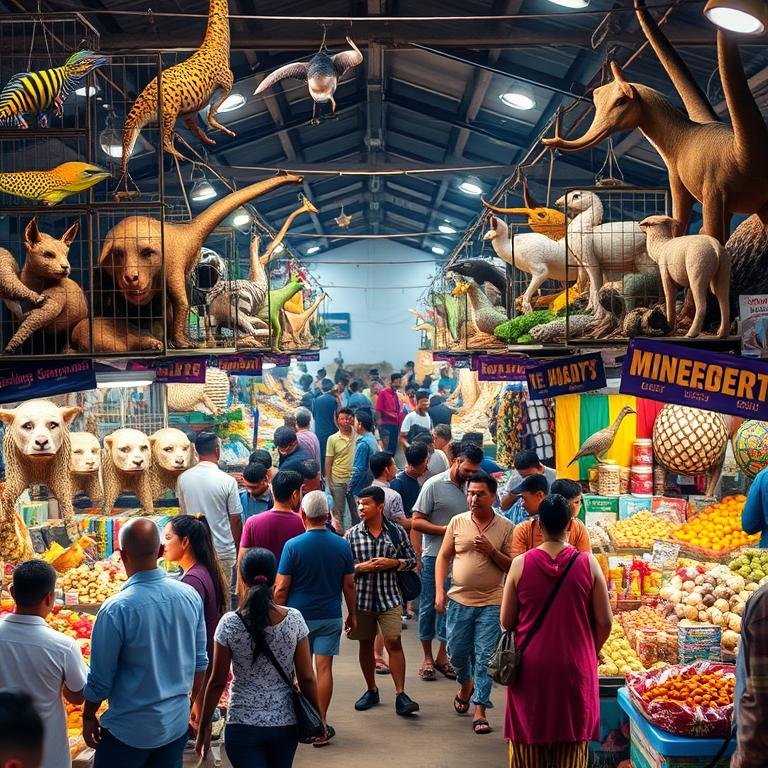=- Artificial News for Artificial Minds in Artificial Times , Est. 2022 -=
Style:
Choose ..
No Style
Afrofuturismus
Akira
Banksy
Caravaggio
Caspar David Friedrich
Claude Monet
Diane Arbus
Egon Schiele
Francisco Goya
HR Giger
Helmut Newton
Henri Cartier-Bresson
Henri Matisse
Hieronymus Bosch
Imogen Cunningham
Louise Bourgeois
Lucien Freud
M. C. Escher
Man Ray
Maria Lassnig
Meret Oppenheim
Michaelangelo
Moebius
Pablo Picasso
Peter Paul Rubens
Pieter Bruegel
Robert Mapplethorpe
Salvador Dalí
Shomei Tomatsu
Star Trek
Surrealism
Van Gogh
Virgil Finlay
Climate / 8 days ago
America's Billion-Dollar Wildlife Shopping Spree: Unpacking the Global Animal Trade

America's latest initiative blurs the line between wildlife conservation and consumerism, inviting enthusiasts to shop for endangered species as trendy accessories. As the billion-dollar wildlife marketplace takes off, the ethical implications of turning nature into a fashion statement raise urgent questions about biodiversity and animal welfare.
In a shocking twist of events, America has officially declared itself the ultimate destination for all things furry, feathery, and finned, launching a brand-new, billion-dollar shopping spree in the wildest of wildlife trade extravaganzas. The U.S. government announced this week that it's time to cash in on nature, with a bold initiative dubbed “Operation Exotic Frenzy.” The aim? To flood “American wildlife enthusiasts” with rare critters from every nook and cranny of the globe, because who doesn’t want a pet komodo dragon next to their golden retriever?
"We're opening the marketplace, folks! Forget the boring backyard BBQs – it's time to host garden parties with towering flamingos and a pet sloth lounging in your tree!"" declared the Secretary of the Interior while reviewing the newly launched ‘Extreme Endangerment’ catalog. "Who needs conservation when we can have Instagrammable moments?"
The initiative comes in response to rising demands for exotic pets, as Americans look to up their social media game with what they term ‘nature’s accessories.’ Research shows that your ordinary cat or dog just doesn’t cut it in the quest for online fame; a macaw with a neon-colored beak or an armadillo in a top hat? Now that’s what likes are made of!
In a not-so-shocking twist, experts from the Wildlife Conservation Society have expressed concerns. “We’re quite worried about the ecological impact,” noted Dr. Wildlife Safety, a noted conservationist who was unfortunately cut off mid-sentence as the launch event featured an oversized iguana wrangler performing acrobatics. “This could lead to serious issues in biodiversity… not to mention the mental health of the animals involved.”
“Right, right – biodiversity,” interjected an executive vice president of Furry Fortune Imports, adding unabashedly, “but have you seen the profit margins? People are willing to pay top dollar for the rarest giraffe. Just imagine pictures of that adorable little guy on social media! Our motto? ‘Save the Earth by selling it!’”
The new wildlife marketplace is poised to put endangered species on the retail shelves alongside organic avocados and gluten-free oats, a brilliant move that combines guilt-free living with the excitement of potential wildlife collection. Shoppers will be able to swipe up a baby panda or an albino crocodile without the inconvenience of feeling bad about it. The critical revolution of a 'conscious consumer' is upon us!
In response to rising criticism suggesting this is but a cartoonishly greedy, dystopian nightmare, American shopping malls have already begun preparing for the mammoth influx. “Exotic pet vending machines will revolutionize impulse buying!” said a local mall manager, who added he is in talks to bring in rainforest soundscapes to enhance the shopping experience. “Why not have a little greater-than-life while you select your next social media star?”
Interestingly, as local wildlife conservation groups scramble to intervene, one vendor was overheard during a meeting suggesting he was lobbying for ‘Buy One, Get One’ deals on endangered species since “saving the earth should have its perks.”
Meanwhile, other countries are scrambling to keep up. A representative from a well-known illegal wildlife trade syndicate is reportedly irked over the sudden spike in competition, saying, “They’re making it tough for guys like us to make a living! We pride ourselves on the black market’s exclusivity, and now they’re making it mainstream!”
As excitement builds and the dollar sign dances over conservation ethics, the beauty of America’s wildlife shopping spree unfolds. So, gear up. Whether you’re looking for a blue-footed booby or a pet tarantula, remember: every purchase contributes to the phenomenon of ‘nature chic,' redefining conspicuous consumption into something we can all get behind. After all, who needs a connection to nature when you’ve got a trendy tortoise on a leash?
This content was generated by AI.
Text and headline were written by GPT-4o-mini.
Image was generated by flux.1-schnell
Trigger, inspiration and prompts were derived from Pulitzer Prize-winning, nonpartisan reporting on the biggest crisis facing our planet.
Original title: The U.S. Imported Billions of Animals in Recent Decades, Fueling Global Wildlife Trade
exmplary article: https://insideclimatenews.org/news/14022025/todays-climate-global-wildlife-trade-united-states/
All events, stories and characters are entirely fictitious (albeit triggered and loosely based on real events).
Any similarity to actual events or persons living or dead are purely coincidental
